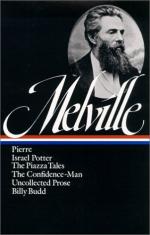“Poor Richard!—call her Poor Richard, then,” cried Israel, suddenly struck by the idea.
“’Gad, you have it,” answered Paul, springing to his feet, as all trace of his former despondency left him;—“Poor Richard shall be the name, in honor to the saying, that ‘God helps them that help themselves,’ as Poor Richard says.”
Now this was the way the craft came to be called the Bon Homme Richard; for it being deemed advisable to have a French rendering of the new title, it assumed the above form.
A few days after, the force sailed. Ere long, they captured several vessels; but the captains of the squadron proving refractory, events took so deplorable a turn, that Paul, for the present, was obliged to return to Groix. Luckily, however, at this junction a cartel arrived from England with upwards of a hundred exchanged American seamen, who almost to a man enlisted under the flag of Paul.
Upon the resailing of the force, the old troubles broke out afresh. Most of her consorts insubordinately separated from the Bon Homme Richard. At length Paul found himself in violent storms beating off the rugged southeastern coast of Scotland, with only two accompanying ships. But neither the mutiny of his fleet, nor the chaos of the elements, made him falter in his purpose. Nay, at this crisis, he projected the most daring of all his descents.
The Cheviot Hills were in sight. Sundry vessels had been described bound in for the Firth of Forth, on whose south shore, well up the Firth, stands Leith, the port of Edinburgh, distant but a mile or two from that capital. He resolved to dash at Leith, and lay it under contribution or in ashes. He called the captains of his two remaining consorts on board his own ship to arrange details. Those worthies had much of fastidious remark to make against the plan. After losing much time in trying to bring to a conclusion their sage deliberations, Paul, by addressing their cupidity, achieved that which all appeals to their gallantry could not accomplish. He proclaimed the grand prize of the Leith lottery at no less a figure than L200,000, that being named as the ransom. Enough: the three ships enter the Firth, boldly and freely, as if carrying Quakers to a Peace-Congress.
Along both startled shores the panic of their approach spread like the cholera. The three suspicious crafts had so long lain off and on, that none doubted they were led by the audacious viking, Paul Jones. At five o’clock, on the following morning, they were distinctly seen from the capital of Scotland, quietly sailing up the bay. Batteries were hastily thrown up at Leith, arms were obtained from the castle at Edinburgh, alarm fires were kindled in all directions. Yet with such tranquillity of effrontery did Paul conduct his ships, concealing as much as possible their warlike character, that more than once his vessels were mistaken for merchantmen, and hailed by passing ships as such.




